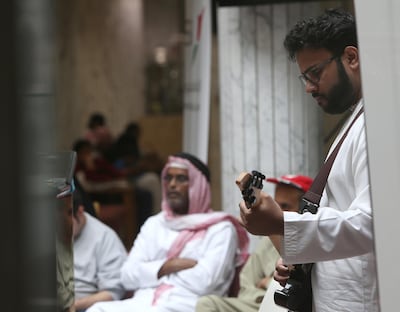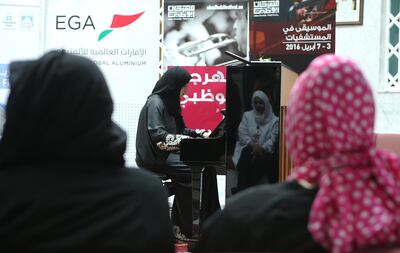When nursing specialist Debra Sheets recently helped launch a choir for people with dementia in Victoria, Canada, she noticed an improvement in patients' ability to remember words. Her two-year study monitored changes in mood and cognitive function and singing regularly, she noted, seemed to tap into a different part of the brains of those taking part.
As a professor of psychology, I am frequently exposed to therapies that seem new and innovative. In my native UK, where one million people are expected to be living with dementia by 2025, I once attended an unforgettable group session of music therapy. A professional harpist plucked away at his instrument while each member of the group, myself included, took turns to sit with our backs pressed against its wooden frame, our bodies absorbing the vibrations. I found the experience deeply relaxing. Some of the other participants were moved to cathartic, healing tears.
Finding healing in the arts is not a new concept; indeed, it goes back millennia. The Old Testament, for example, talks about King Saul's depression and subsequent musical intervention. There is also the rich Arab-Andalusian tradition of healing with music. For more than 1,000 years, the Muslim world used music to treat both physical and psychological complaints. In Morocco, the Arab-Andalusian orchestra of Fez would perform a weekly concert in hospitals for those with mental illnesses, according to The Oxford Handbook of Medical Ethnomusicology. This tradition was alive and well even 40 years ago.


Recently, the tradition of music to foster well-being has been rekindled. There has been pioneering research at Canterbury Christ Church University in Kent in the south-east of England, for example, in which dementia patients have been brought together to form choirs. As part of this project, some patients even performed at a public concert. One of the lead researchers of the project, Dr Trish Vella-Burrows, suggested that as well as alleviating symptoms of anxiety and depression that are associated with dementia, singing might help keep patients out of care homes or at least substantially delay such an eventuality.
Beyond music and choral therapies, doctors today are prescribing alternative remedies that might seem odd in an age of high-tech diagnostics and increasingly advanced medication. In recent years, for example, doctors have been prescribing eco-therapy constituting walks in the countryside, interacting with animals as pet therapy and watching comedy movies for laughter therapy.
In the UAE, my colleagues and I recently entertained a visiting researcher from the UK who introduced us to “the laughie” – the laughter equivalent of the selfie. This new technique, pioneered at the University of Derby, requires a person to record themselves as they laugh for a whole minute. I made a group laughie on my smartphone with a few of my colleagues and even though it felt bizarre to be laughing at nothing, it was surprising how quickly the synthetic, fake laughter morphed into the real thing.
The idea behind the laughie is that the person can replay the recording and laugh at will, a few times each day. A good laugh reduces stress hormones and is associated with a lower risk of heart disease.
Despite some outlandish and unsubstantiated claims by a minority of overzealous practitioners, many of these therapies are supported by research and clinical experience. In the world of psychotherapy, there are now so many viable therapies that it has led to what psychologists term the dodo bird verdict.
"Everyone has won, and all must have prizes," declares the dodo bird in Lewis Carroll's Alice in Wonderland. In psychotherapy circles, the "dodo bird verdict" is indicative of the controversial idea that all treatments are equally effective and that it is not the specific content that matters but certain key elements that are common across many forms of therapy.
For instance, most psychological interventions involve regular contact with a sympathetic therapist who is keen to listen, understand and not judge. Merely being engaged in therapy engenders a degree of hope, which is a powerful medicine. In group therapies, a sense of belonging and camaraderie typically develops, independent of any specific therapeutic activity, whether singing, laughing or talking. The power of groups is now so widely accepted that psychologists have begun talking about “the social cure”.
On closer examination though, the dodo bird verdict is not the whole story. It has become evident that certain therapies outperform others. For example, in the treatment of bulimia, there is overwhelming evidence that cognitive therapy generally outperforms psychoanalysis. And mindfulness-based cognitive therapy beats all others at preventing relapse in major depressive disorders – the rising prevalence of which dictates the need for evidence-based therapies as well as preventative interventions. So if singing works, then let’s sing. If laughter is the best medicine, let’s all laugh.
In general, we know that kindness and listening to people are helpful. As a society, a simple therapeutic step we can all take is to be kinder, more inclusive and more attentive.
Justin Thomas is a psychology professor at Zayed University






